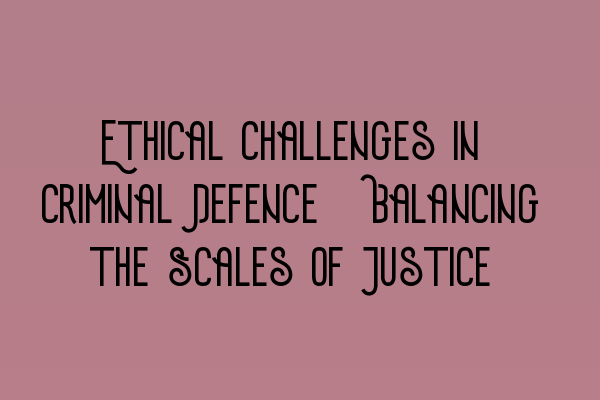Ethical Challenges in Criminal Defence: Balancing the Scales of Justice
As criminal defence lawyers, we are entrusted with the important task of upholding the principle that every accused individual deserves a fair trial and that justice must be served. However, navigating the complex legal landscape while also adhering to strict ethical standards can present significant challenges. In this blog post, we will explore some of the ethical challenges faced by criminal defence solicitors and how we strive to balance the scales of justice.
The Duty of Confidentiality
One of the key pillars of legal ethics is the duty of confidentiality. Criminal defence solicitors are bound by this duty, which means that any information shared by our clients is deemed confidential and cannot be disclosed without their consent. This pledge ensures that individuals feel safe and secure when seeking legal representation, allowing them to disclose all relevant information for their defence.
However, this duty of confidentiality can sometimes clash with our duty to the court and the administration of justice. In situations where the client discloses information that may pose a threat to the safety of others or when knowledge of a crime is revealed, the ethical challenge lies in deciding whether to breach confidentiality in order to prevent further harm.
Keywords: ethical challenges, criminal defence, duty of confidentiality, legal ethics, legal representation, administration of justice, breach confidentiality
The Principle of Zealous Advocacy
Another ethical challenge faced by criminal defence solicitors stems from the principle of zealous advocacy. We are duty-bound to provide our clients with the strongest possible defence, vigorously advocating for their rights and presenting their case in the most favorable light.
This principle, however, can sometimes clash with maintaining truthfulness in the courtroom. While we strive to provide the best defence possible, we must also ensure that we do not misrepresent facts or present false evidence. Striking a balance between zealous advocacy and maintaining our ethical duty of honesty can be a delicate task.
Keywords: ethical challenges, criminal defence, zealous advocacy, strongest possible defence, truthfulness, misrepresent facts, false evidence, ethical duty
Conflicts of Interest
Conflicts of interest can arise in criminal defence cases, posing ethical challenges for solicitors. When representing multiple clients involved in the same case, there may be competing interests that require careful consideration. We must navigate these conflicts and ensure that our duty of loyalty to each client is upheld without compromising the integrity of the justice system.
Additionally, conflicts of interest can also emerge when a solicitor has prior knowledge of a case or is associated with an individual involved in the matter. In such situations, it becomes crucial to assess the potential impact of these conflicts and make an informed decision about whether to represent the client or refer them to another solicitor.
Keywords: ethical challenges, criminal defence, conflicts of interest, multiple clients, competing interests, duty of loyalty, integrity of the justice system, prior knowledge, associated individuals, informed decision
Ensuring Access to Justice for All
One of the fundamental ethical principles is ensuring equal access to justice for all individuals, regardless of their social, economic, or personal circumstances. Criminal defence solicitors play a vital role in this by providing legal representation to those who may otherwise be unable to afford it.
However, the ethical challenge lies in balancing the need to provide pro bono representation or accepting cases with limited financial resources, while also running a sustainable legal practice. Striving to strike this balance ensures that we can continue to fulfill our ethical obligations while also making justice accessible to all.
Keywords: ethical challenges, criminal defence, access to justice, equal access, social circumstances, economic circumstances, legal representation, pro bono representation, limited financial resources, sustainable legal practice, ethical obligations
Conclusion
Ethical challenges are an integral part of criminal defence practice. Negotiating the fine line between maintaining confidentiality, zealously advocating for clients, managing conflicts of interest, and ensuring access to justice can be a complex endeavor. However, by staying committed to our ethical responsibilities and constantly evaluating and adapting our approach, we can effectively balance the scales of justice and ensure a fair and equitable legal system.
